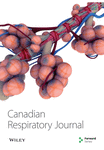Adjunctive Corticosteroid Therapy Decreases Lung Permeability in Patients with AIDS-Related Pneumocystis carinii Pneumonia
Abstract
OBJECTIVE: To assess the effect of adjunctive corticosteroid therapy on lung permeability as measured by Tc-DTPA lung clearance scan in patients with AIDS-related Pneumocystis carinii pneumonia (PCP).
METHODS: Sixteen patients with microbiologically proven AIDS-related PCP were prospectively studied using sequential Tc-DTPA lung clearance scan. All patients received slant.lard antimicrobial treatment. Six patients received adjunctive oral corticosteroids in addition to the usual antimicrobial therapy. Tc-DTPA lung clearance scan was performed al baseline and during the second week of therapy. All scans were read by a blinded single observer using a standardized protocol.
RESULTS: Baseline Tc-DTPA lung clearance halftime (T1/2) was 12±2 and 9±1 mins in the noncorticosteroid and corticosteroid treated groups, respectively. During the second week of therapy, Tc-DTPA T1/2 lung clearance was 17±8 and 24±9 mins for the noncorticosteroid and corticosteroid treated groups, respectively. The change in Tc-DTPA lung clearance between baseline and week 2 was significantly greater (P<0.02) in the corticosteroid treated patients.
CONCLUSION: Data suggest that the use of adjunctive corticosteroid therapy decreases lung permeability, as measured by Tc-DTPA lung clearance scan, in patients with AIDS-related PCP.




